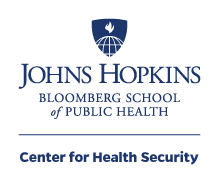India-US Biosecurity Dialogue II
8-9 February 2017
Shangri-La Hotel, New Delhi, India
The UPMC Center for Health Security hosted the second meeting of a bilateral biosecurity dialogue between delegates representing the United States and India. This effort was supported by the Project on Advanced Systems and Concepts for Countering WMD (currently affiliated with the US Air Force Institute for National Security Studies), and sponsored by the Defense Threat Reduction Agency. The meeting took place in New Delhi, India and included discussions on the biosecurity landscapes of the US and India, the life sciences and biotechnology, biosafety-strengthening efforts at laboratories, risk assessment, biological threat characterization, and cross-sector collaboration for mitigating biological threats.
Agenda
8 February 2017
9:30 – 09:45 Welcome, Goals for Meeting, and Introductions
Dr. S. R. Rao, Advisor, Department of Biotechnology, Ministry of Science & Technology, Government of India
Dr. Tom Inglesby, Director, Johns Hopkins Center for Health Security
9:45 – 10:15 Inaugural Remarks: Dr. Krishnaswamy VijyaRaghavan, Secretary, Department of Biotechnology, Ministry of Science & Technology, Government of India
10:15 – 11:15 Dialogue Session One: National Outlook on Biosecurity and Security
Biosecurity concerns and challenges change over time, and are addressed within the context of other political priorities. In this opening session, we will discuss how each country views concerns related to biosecurity threats and challenges – natural and deliberate. Is preparedness for biological threats considered of importance to each country’s own national security? What are considered the most important elements of preventing and preparing for major biological threats? How was the outcome of the Biological Weapons Convention perceived? What geopolitical issues are affecting those priorities? To what extent are biological risks perceived to come from states vs. groups (or individuals)? What do you think of the efforts of the UN Security Council to fight international WMD terrorism, including bio? This session will also explore historical contexts underlying biosecurity practices in both countries. A representative from each country will provide opening remarks (5-7 minutes) on this topic, followed by a discussion by all participants.
Opening Remarks: Ambassador Rakesh Sood; Dr. David Franz
11:15 - 11:30 Coffee Break
11:30 – 12:30 Dialogue Session Two: Dual-use Issues in the Life Sciences
Emerging biotechnologies are profoundly important to India and the US for medicine, health, and for economic development. These developments are accompanied by the opportunity to develop more effective medical countermeasures and public health measures (such as using gene drives to reduce mosquito populations), but also increased risks for the potential for new weapons and for consequential accidents. There are also concerns about misuse. How do the US and India see the future of biotechnology changing the potential risks of misuse? How does each country now manage these new risks? What new approaches might be needed in the future? In light of these trends, how should each country go about making strategic investments in biosecurity? A representative from each country will provide opening remarks (5-7 minutes) on this topic, followed by a discussion by all participants.
Opening Remarks: Dr. Subodh Kumar, Dr. Sarah Carter
12:30 – 1:30 Lunch in TAMRA Restaurant, Shangri-La Hotel
1:30 – 2:30 Dialogue Session Three: Biosecurity & Biosafety in Laboratories
This session will focus on the future of biosafety in India and the US. What are the most pressing biosafety issues in India and in the US, and how does each view biosafety problems on the horizon? How much political attention is paid to biosafety? How can collaborations between the US and India better serve the future incorporation of biosafety principles into scientific work and scientific training? How is biosecurity prioritized relative to biosafety? What scientific practices or training is concerning to you from a biosafety perspective, taking place anywhere in the world? A representative from each country will provide opening remarks (5-7 minutes) on this topic, followed by a discussion by all participants.
Opening Remarks: Dr. Siva Reddy, Dr. Jayati Mullick, Dr. Maureen O’Leary
2:30 – 3:00 Group Photo, and board bus
3:00 – 6:00 Visit to the International Centre for Genetic Engineering and Biotechnology (ICGEB) and Jawaharlal Nehru University (JNU)
6:00 Meeting Adjourns
6:00 Dinner Caraway Restaurant, The Grand New Delhi
9 February, 2017
9:30 – 10:45 Dialogue Session Four: Emerging Infectious Diseases, Preparedness and the Scientific Response
This discussion will explore approaches for early detection and surveillance in response to new outbreaks, opportunities to improve international collaboration on these issues, and the scientific response to emerging infectious diseases. What has been learned in the response to SARS, MERS, novel flu, Ebola, and/or Zika? What disease containment lessons emerge from these outbreaks? What are priority areas in terms of building national response capacity, and building the technical capacity to mount an effective response? What is the perception of progress made and future action needed to adhere to the International Health Regulations and the Global Health Security Agenda? A representative from each country will provide opening remarks (5-10 minutes) on this topic, followed by a discussion by all participants.
Opening Remarks: Dr. Sudhanshu Vrati, Dr. Dan Hanfling
10:45 – 11:00 Coffee Break
11:30 - 12:45 Dialogue Session Five: Risk Assessment and Reduction of Future Biological Threats for the Modern Age>
In this session, we will discuss how the US and India can diminish biosecurity risks through scientific engagement (for example, as it has been envisaged through US biological threat reduction and engagement programs). How does each country undertake risk assessment for biological risks, and is that risk assessment connected to policy and to resource allocation? How are opportunities to prevent biosecurity risks perceived as policy options, and are there policies that are intended to reduce future risks? This discussion will consider the role of collaborative relationships between scientists, public health practitioners, and the security community intended to reduce or prevent biosecurity risks.
Opening Remarks: Dr. S.R. Rao, Dr. Ravi Khetrapal, Dr. David Franz
12:45 – 2:00 Lunch in TAMRA Restaurant, Shangri-La Hotel
2:10 – 3:15 Dialogue Session Six: Productive Engagement and Collaboration
This discussion will explore how India and the US can productively collaborate and foster engagement on biosecurity issues. Collaborations could include formal and less-formal opportunities to collectively and collaboratively reduce the threat of emerging infectious diseases such as MERS and new influenza viruses, deliberate and accidental misuse of biological research, risk assessment, and/or opportunities to increase the likelihood of early intervention, attribution, and resolution of an outbreak. What challenges or opportunities should receive Track 1 attention by India and the US but are not as yet? A representative from each country will provide opening remarks (5 minutes) on this topic, followed by a discussion by all participants.
Opening Remarks: Dr. Indira Nath, Dr. David Rakestraw
3:15 – 4:00 Proposals for Future Biosecurity Dialogue Topics
Group Discussion about topics for discussion for the next meeting.
4:00 Meeting Adjourns
Meeting Participants
Rakesh BHATNAGAR, PhD
Professor
J. C. Bose National Fellow
Room No. 102
School of Biotechnology
Jawaharial Nehru University
New Delhi, India
Sarah R. CARTER, PhD
Principal
Science Policy Consulting LLC
David R. FRANZ, DVM, PhD
Jaishree GARHYAN, PhD
Jawaharial Nehru University
New Delhi, India
The Forsyth Institute, Cambridge, USA
Gigi GRONVALL, PhD
Senior Associate
Johns Hopkins Center for Health Security
Dan HANFLING, MD
William P. HOSTYN, MS
Director, Advisory Committees and Programs Office
Defense Threat Reduction Agency
Tom INGLESBY, MD
Director
Johns Hopkins Center for Health Security
Ravi KHETARPAL, PhD
Regional Advisor (Strategic Science Partnerships)
CABI – South Asia
Pusa, New Delhi, India
Subodh KUMAR, PhD
Scientist ‘F’
Defence Research & Development Establishment (DRDE)
Defence Research & Development Organisation
Govt. Of India, Ministry of Defence
Gwalior, India
Jayati MULLICK, PhD
Scientist E
Group Leader, Avian Influenza,
In-charge, High Containment Laboratory,
National Institute of Virology,
Pune, India
Indira NATH, MD
Former, Head and Sr. Professor
Department of Biotechnology, AIIMS Delhi
Former, Raja Ramanna Fellow and Emeritus Professor, NIOP, Delhi
Padmashri, India
Maureen O’LEARY, PhD, MBA, CBSP
Director, Environmental Health & Safety
Assistant Adjunct Professor, Geisel School of Medicine
President, ABSA International 2017
Dartmouth College
David J. RAKESTRAW, PhD
S Program Manager
Global Health Security Principal Directorate
Lawrence Livermore National Laboratory
S. R. RAO, PhD
Advisor
Department of Biotechnology
Ministry of Science and Technology
Government of India
New Delhi, India
Sanjana RAVI, MPH
Senior Analyst
Johns Hopkins Center for Health Security
Balachandran RAVINDRAN, PhD
Professor Emeritus
Institute of Life Sciences (Department of Biotechnology)
Bhubaneswar, India
Siva REDDY, PhD
Chief Scientific Officer (CSO)
Biosafety Support Unit
NPC Building
New Delhi, India
Ambassador Rakesh SOOD, PhD
Observer Research Foundation
20, Rouse Avenue Institutional Area
New Delhi, India
Krishnaswamy VIJAYRAGHAVAN, PhD
Secretary
Department of Biotechnology
Ministry of Science & Technology
Government of India
New Delhi, India
Sudhanshu VRATI, PhD, FASc, FNASc
Executive Director
Regional Centre for Biotechnology
NCR Biotech Science Cluster
New Delhi, India
Observers:
Daniel L. GARCIA, PhD, MPH
Senior Lab Advisor
Centers for Disease Control and Prevention (CDC)
Delhi, India
Shaun HAYESLIP
US Department of State
International Security and Nonproliferation/Regional Affairs
Kayla LASERSON, ScD
Country Director
Director, Division of Global Health Protection
Centers for Disease Control and Prevention (CDC) Delhi, India
Evelyn F. OSTROM
Chief, Regional Cooperative Engagement Office - Pacific-South East Asia Defense Threat Reduction Agency US Embassy
27 Napier Road
Singapore
Meeting Report
Summary
There are multiple goals for the dialogue: to expand knowledge and understanding between India and the US about biological threats; increase awareness and probability of exchanges for early warning and detection of unusual biological events; deepen relationships between participants to serve as technical resources to each other going forward; and to identify issues that may warrant official government-to-government priority. Importantly, bilateral ties between the United States and India, the world’s two largest democracies, are of great consequence to global security, defense, and health. In an era of rapid globalization, major geopolitical transitions, and evolving national security landscapes, partnership between the US and India on critical issues in biosecurity and biodefense remains especially important. Developing shared bilateral understandings of and approaches to tackling hard problems in biosecurity promises to strengthen trust and cooperation, enhance health and security in both nations, and facilitate productive collaborative efforts between Indian and American policymakers, national security experts, life scientists, public health professionals, and healthcare practitioners.





